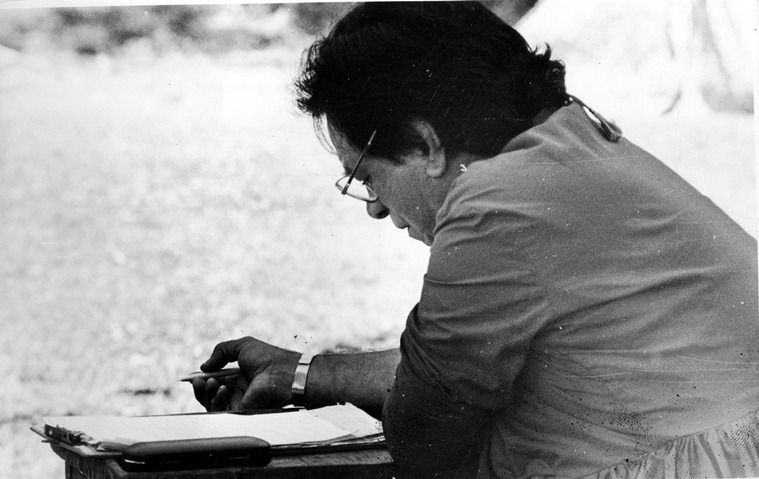
He was the silver-haired mob boss in Parvarish (1977), tossing out the punchy lines (which he had written himself, as its dialogue writer) with relish. He once again played a character with negative shades in Naseeb (1981), this time charred to death by protagonist Amitabh Bachchan in its burning climax. Both films were directed by Manmohan Desai, often called the showman with the famous stock-in-trade that went by the name of lost-and-found. A multi-starrer the likes of which Bollywood doesn’t make anymore, the cast of Parvarish and Naseeb read the who’s who of 1970s Hindi cinema. Besides Bachchan, there was Rishi Kapoor, Shatrughan Sinha, Amjad Khan, Hema Malini, Parveen Babi, Amrish Puri, Prem Chopra, Shakti Kapoor and Pran. Throughout the 1970s and even much later, Kader Khan teamed up with several of these stars to produce some of Hindi cinema’s finest entertainers.
Pran, Amjad Khan and Amrish Puri are long gone. And now, Kader Khan. 81 and ailing, Khan passed away in Canada today but will be mourned and missed widely in India and Pakistan where he has a substantial following, thanks to over 700 popular Hindi films in which he acted and helped write. Bachchan, a lifelong friend (though the late Khan sparred with him in later years), called him a ‘brilliant stage artist’ and a ‘writer of eminence in most of my very successful films’ in a tweet.
“If you were a late 80s-90s kid who watched Hindi films, chances are you encountered the magic of Kader Khan,” tweeted Smriti Irani. Though the Textiles Minister and former TV star never worked with him she said if she ever had, “I would say, ‘thank you for the laughter.” Obviously, the ‘laughter’ bit is an ode to Khan’s seamless transition to comic roles in 1980s and ‘90s, usually in a David Dhawan slapstick with Govinda, Anupam Kher, Johnny Lever, Raveena Tandon and Karisma Kapoor for company.
Engineering his way into Bollywood
Born in Kabul, Afghanistan, Kader Khan’s family moved to India when he was only six months old. He was raised in Bombay and despite difficult circumstances went on to become a professor of civil engineering at Mumbai’s M H Saboo Siddik College of Engineering.
However, his true passion was the stage. He had dabbled in theatre from an early age. By his own account, he would sneak into a Jewish cemetery close to his home in South Mumbai to recite his lines. The audience consisted mainly of the dead. One day, to his utter surprise, he found someone watching him in the graveyard. It was Ashraf Khan, a small-time Bollywood character actor who, one story goes, offered him a role on the spot.
The big Bollywood break came with Yash Chopra’s Daag in 1973 but his best partnership was formed with Manmohan Desai and Prakash Mehra. His iconic dialogues in Amar Akbar Anthony and Muqaddar Ka Sikandar are still quoted by fans. The 1970s saw Kader Khan deliver such hits as Parvarish, Suhaag, Sharaabi, Laawaris, Amar Akbar Anthony and Muqaddar Ka Sikander. In the 1980s, he wrote dialogue for Bachchan in Hum and Agneepath among others. With his knowledge of Urdu poetry and a knack for pouring lived experience into his work, he combined the two – the bombastic with everyday slang – to create a memorable body of work as a dialogue writer.
The Kader Khan magic
The 1990s saw him emerge as a funny-man. In David Dhawan’s Coolie No 1, the versatile star brought the house down as the ironically-named Hoshiyar Chand who gets taken in by the snubbed matchmaker (Sadashiv Amrapurkar). 1998’s Dulhe Raja was about a rich hotelier (Khan) who finds himself outmanoeuvred by a street-smart dhaba owner (Govinda). In dozens of such masala potboilers, Khan was either a wealthy businessman living in the kind of homes that the bathrobe-wearing moneybags lived in the ‘90s or the heroine’s hapless father – or the hero’s dad, as in Aankhen starring Govinda, Chunky Pandey and Bajrangi, the monkey.
After quitting films, Khan developed an interest in Islamic education. His prolonged illness followed by a knee surgery set him on a path to spirituality. The much-loved character actor vanished from the public eye but not, it seems, from the public memory. RIP, Kader Khan.

